
[ad_1]

Introduction
The Tamron 35-150mm F/2-2.8 Di III VXD is a versatile wide-angle to medium telephoto zoom lens for Sony’s range of Alpha 35mm full-frame mirrorless cameras.
The optical formula is comprised of 21 elements in 15 groups, including four LD (Low Dispersion) lens elements to reduce aberrations and three GM (Glass Molded Aspherical) lens elements.
This lens has a minimum focusing distance of 33cm / 13″ with a maximum magnification ratio of 1:5.7.
It features a rounded 9-blade diaphragm which creates an attractive blur to out-of-focus areas of the image and an internal focusing mechanism which means the lens barrel doesn’t move.
The Tamron 35-150mm uses the very latest VXD linear motor focus mechanism for fast, quiet and precise auto-focusing, and full-time manual focus override is also possible.
There are two Focus Control buttons, Custom and Lock switches, a USB Connector Port, and it has a moisture-sealed construction.
The Tamron 35-150mm was first announced in August 2021 and it is designed and made in Japan.
The Tamron 35-150mm F/2-2.8 Di III VXD lens is available now priced at £1599 / $1899 in the UK and USA, respectively.
Ease of Use
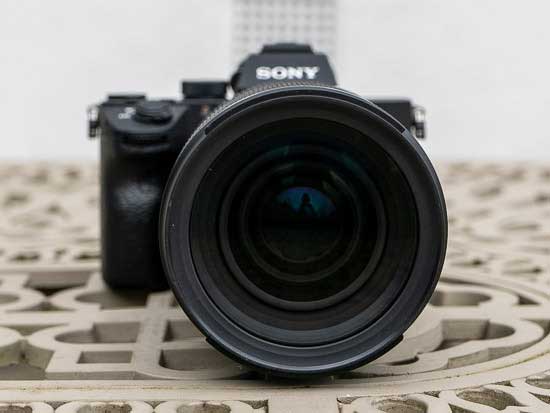
Given the fast and constant f/2-2.8 maximum aperture and wide zoom range, the Tamron 35-150mm F/2-2.8 Di III VXD is unsurprisingly a rather large and rather heavy lens, measuring almost 16cms in length and weighing in at well over 1kg – 1,165g to be precise.
If you consider that it could effectively replace both a 28-70mm and 70-200mm lens in a typical event photography setup, however, it’s actually substantially lighter, just so long as you don’t mind the reduction in zoom range at either end.
While you can use it on a smaller APS-C body like the Sony A6000 series of cameras, it won’t balance particularly well and the equivalent focal length will also change to 52-225mm.
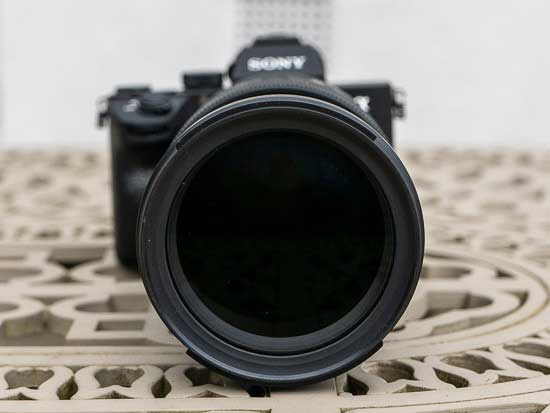
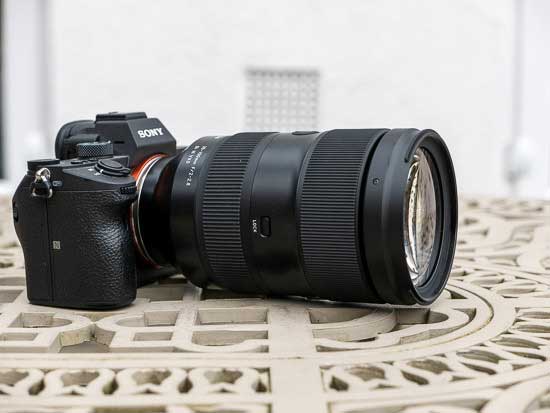
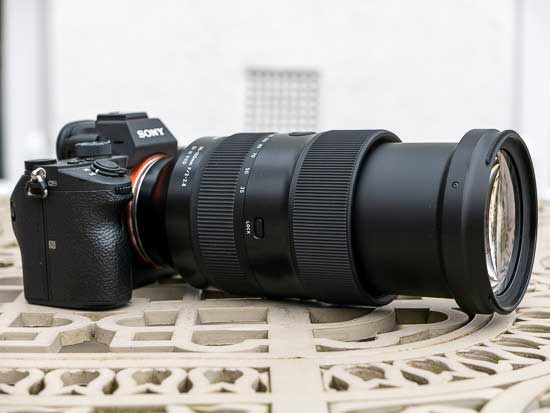
As demonstrated by the product images, it’s a much better match for a more professional full-frame camera like the Sony A7R IV that we tested it with, where it just feels better balanced and more “at home”.
Build quality is excellent, despite Tamron traditionally offering lenses at the cheaper end of the market. The Tamron 35-150mm F/2-2.8 Di III VXD feels very solid in your hand, with the outer barrel made from high-grade plastics as in all of their recent lenses.
Compared to previous Tamron lenses, though, the 35-150mm has a more glossy, shinier black finish, a redesigned pattern on the focus and zoom rings, and a more scratch and fingerprint resistant exterior.
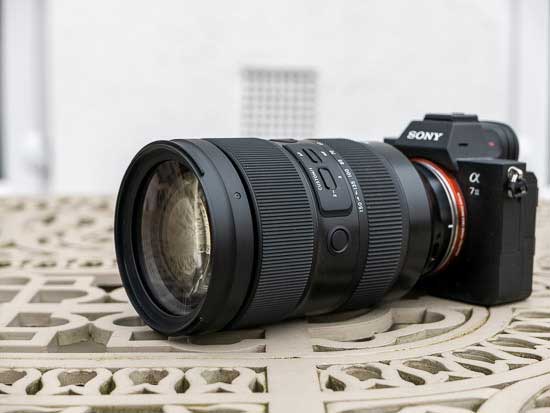
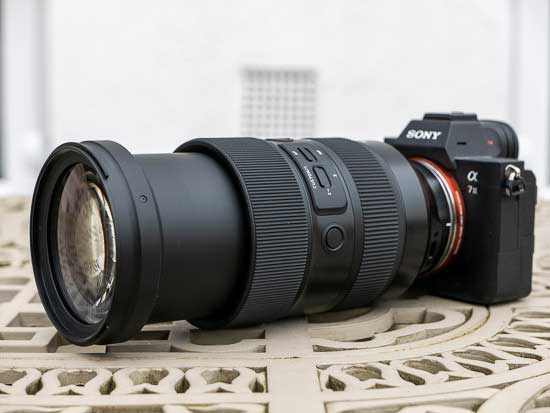
The Tamron 35-150mm F/2-2.8 Di III VXD feels solid enough in your hand, despite its mostly polycarbonate construction. It has a metal lens mount.
The zoom ring is wide enough , offers a smooth action and has a tactile ridged, rubberised grip band. The lens extends by about an extra 4.5cm when fully zoomed out to 150mm.
The 35-150mm F/2-2.8 Di III VXD features a Lock switch which fixes the lens at its 35mm setting and prevents it from extending when it’s pointed downwards, although we didn’t really notice any zoom creep.
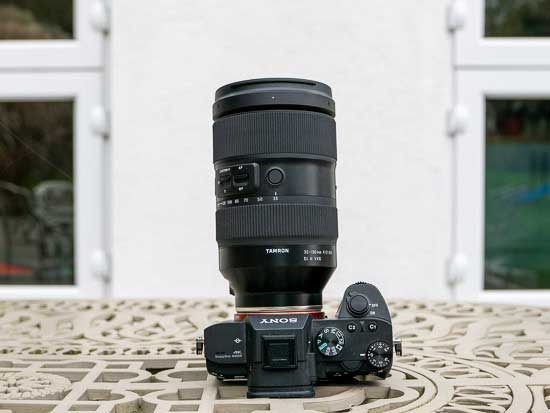
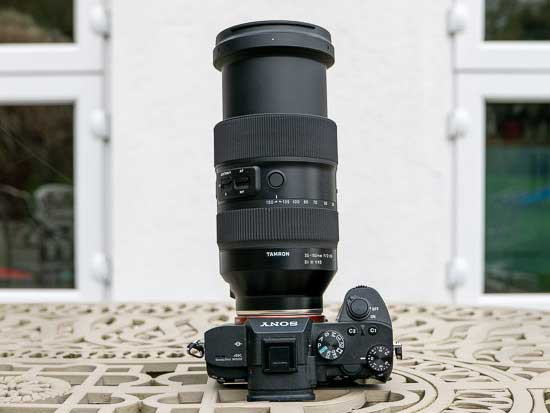
There are two focus control buttons, a feature that is found on many other Tamron zooms.
The other significant new feature is the USB-C Connector Port, which allows you to update and customise the lens directly using the TAMRON Lens Utility software, rather than via a camera body.
We are a little concerned that this port is uncovered, though, and therefore not protected from the elements, although Tamron have assured us that it is fully waterproof.
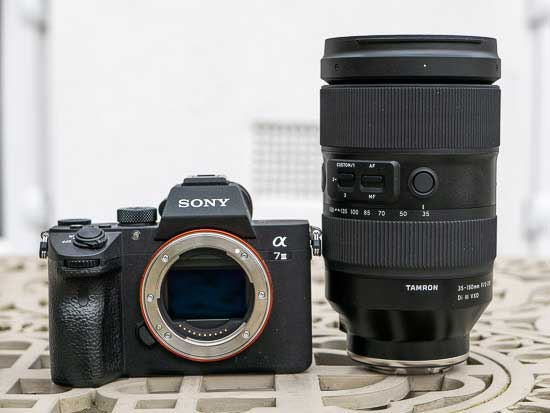
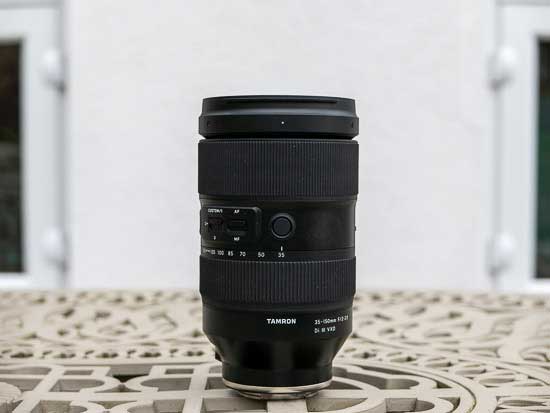
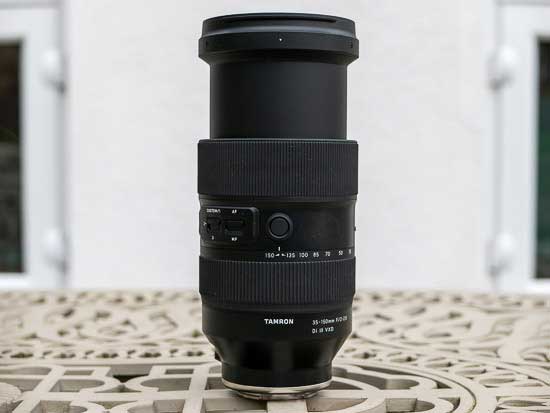
In the customisation options, the direction and speed of focus can be changed. The focus ring can be used for aperture instead of manual focusing, while the focus hold buttons can be customised for preset focus points 1 and 2 for video so that you can pull focus from one to the other at a designated speed.
The focusing ring is located towards the end of the lens mount, which is the reverse of the 28-75mm F2.8 Di III VXD G2 that we recently reviewed, making it slightly unintuitive and harder to locate in a rush.
The Tamron 35-150mm F/2-2.8 Di III VXD features the latest high-speed VXD ((Voice-coil eXtreme-torque Drive) which is said to be twice as fast as the older RXD motors. It also allows for virtually silent auto-focusing, making it well-suited to video use.
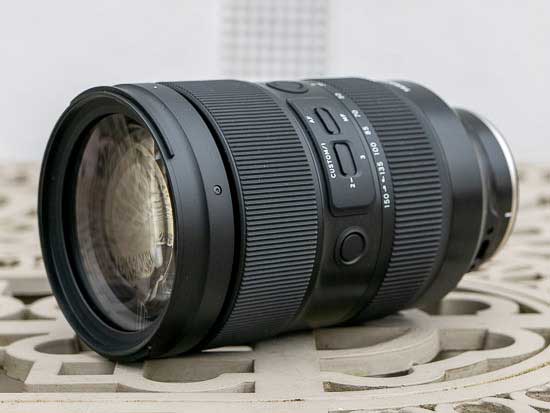
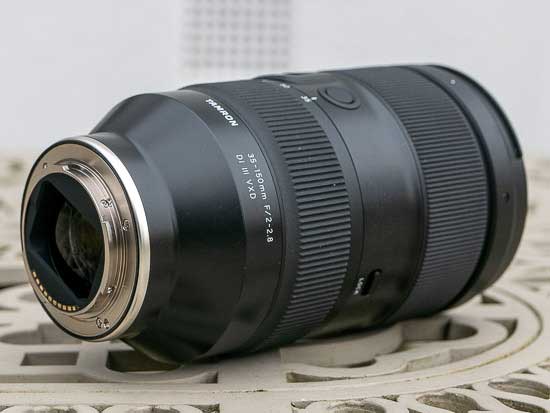
In use, we found the VXD focusing system to be very quiet and also very fast with the lens mounted on a Sony A7R IV camera.
Importantly, the lens is fully compatible with the “Direct Manual Focus (DMF)” system feature of Sony cameras that enables the user to instantly switch between autofocus and manual focus.
Focusing is fully internal but zooming is not, with the length of the lens changing as you zoom from 35mm to 150mm.

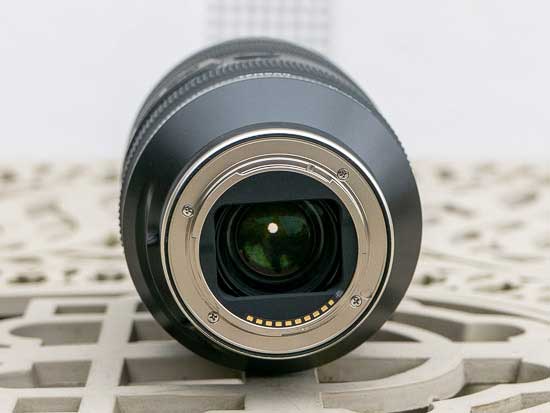
The Tamron 35-150mm F/2-2.8 Di III VXD isn’t fully weather-proof but it does benefit from a moisture-resistant construction with 10 internal seal points and a rubber gasket around the mount.
This helps to prevent moisture from penetrating the lens, although we’d hesitate to use it in the rain for a prolonged period of time.
The front element has a hydrophobic Fluorine Coating that is highly resistant to fingerprints and debris.
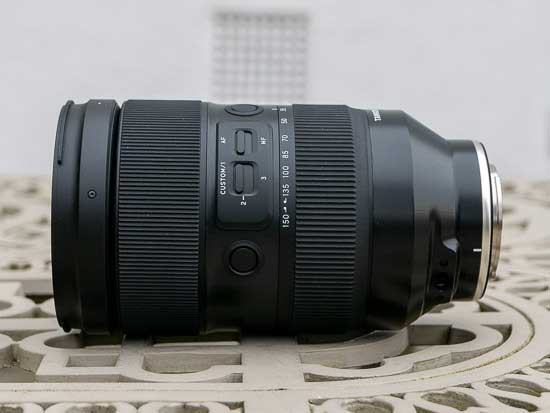
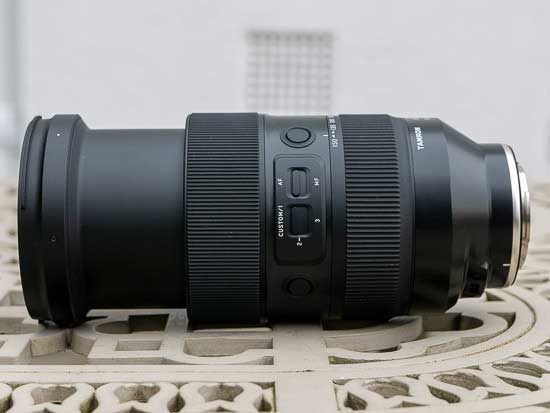
The lens is supplied with plastic lens caps and a plastic flower-shaped lens hood (HA058) – there’s no lens bag included. The filter size is 82mm.
Note that this lens is not compatible with Tamron’s range of teleconverters. Also there is no official tripod collar/mount available for it, although a third-party one may well be released in the future.
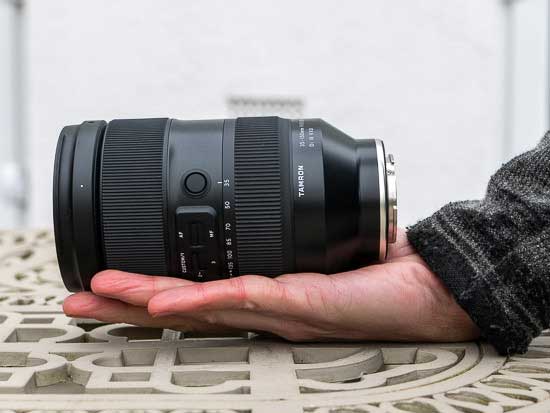
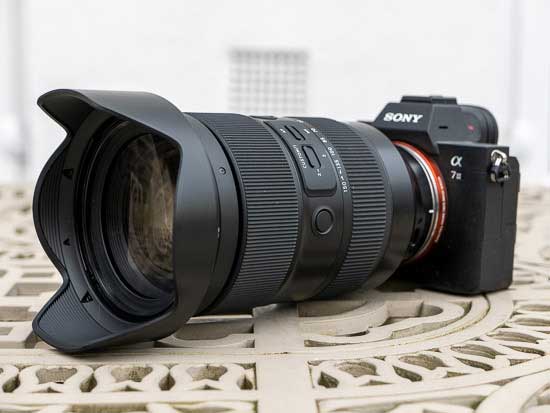
Focal Range
At the 35mm focal length the angle of view is 63°26′ degrees.
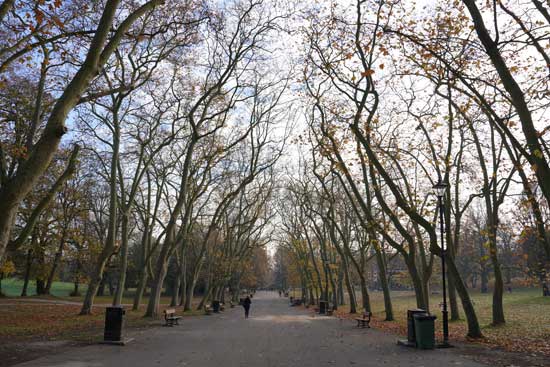
35mm
At the 150mm focal length the angle of view is 16°25′ degrees.

150mm
Chromatic Aberrations
Chromatic aberrations, typically seen as purple or blue fringes along contrasty edges, are well controlled with this lens.

35mm

150mm
Vignetting
With the Tamron 35-150mm F/2-2.8 Di III VXD wide open at f/2-2.8, you can see some noticeable light fall-off in the corners. Stopping down helps, although to completely get rid of this phenomenon, you will need to use an f-stop of f/5.6 or smaller.

35mm

150mm
Distortion
Barrel distortion is well controlled, but there’s quite a lot of pin-cushion distortion evident at 150mm in both the JPEG and RAW files which you’ll need to correct in post-processing until a suitable lens profile is released for your editing software.

35mm

150mm
Macro
The Tamron 35-150mm F/2-2.8 Di III VXD isn’t claimed to be a macro lens, but it delivers pretty good performance nonetheless if you zoom to 150mm.
The close-focus point is an impressive 33cm from the film/sensor plane at the 35mm focal length (85cm at 150mm) and it has a maximum magnification ratio of 1:5.7 at the 35mm focal length (1:5.9 at 150mm).





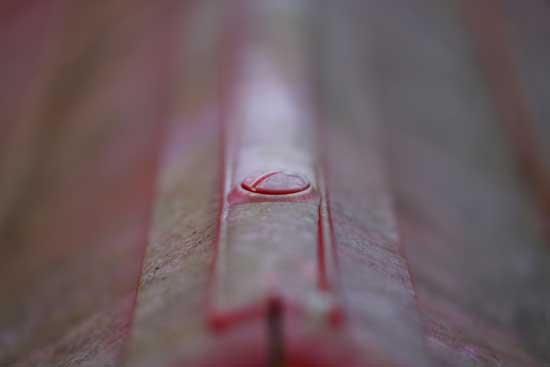

Bokeh
Bokeh is a word used for the out-of-focus areas of a photograph, and is usually described in qualitative terms, such as smooth / creamy / harsh etc.
One of the reason to buy such a fast lens as the Tamron 35-150mm F/2-2.8 Di III VXD is to be able to isolate the subject from the background.
Tamron was apparently very much aware of this requirement, as they employed an iris diaphragm with 9 rounded blades for a pleasing rendering of the out-of-focus highlights. Based on what we have seen, we can say that they largely succeeded.
Below you’ll find some examples, but you are also encouraged to check out our sample images.


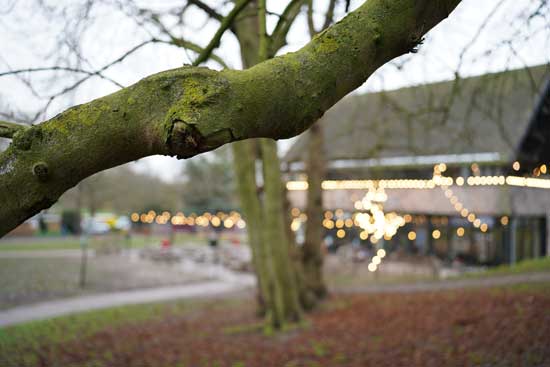


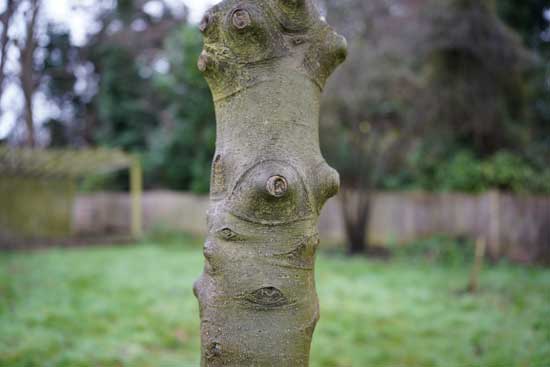
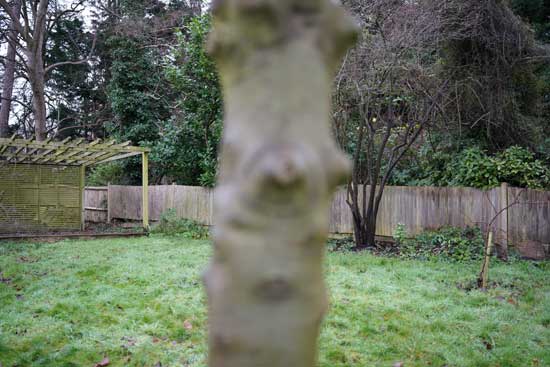


Sharpness
In order to show you how sharp the Tamron 35-150mm F/2-2.8 Di III VXD lens is, we are providing 100% crops on the following pages.
[ad_2]






